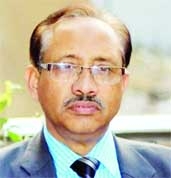
SAU Correspondent :
Prof. Dr. Md. Shahidur Rashid Bhuiyan is currently the Vice-Chancellor of Sher-e-Bangla Agricultural University (SAU). He published 25 interactive agricultural science books including biotechnology, GMO, food and nutrition. He has a total of 202 popular science articles in national and international newspapers. He also has 101 articles in different scientific papers in various journals at home and abroad and presented 37 papers in different seminars and conferences. He is a plant breeder who developed and released three rapeseed varieties for commercial production.
He was awarded Bangabandhu National Agriculture Award (Gold Award) for his outstanding contribution to agricultural research. Recently he made a conversation with The New Nation about agricultural education, research, modern technology and many other topics.
New Nation: You were the director of SAU Research System. What complications you faced there while serving the post, and how did you overcome the situation to offer a good research environment in SAU?
Vice-Chancellor: I was in charge of SAU Research System director during 2016-17 session. Before that, there was little scope of research in SAU and therefore, teachers had
have little experience. I took an initiative to enhance research facilities and broaden the scope of professionalism among teachers to ensure quality research. I contrived around 18 seminars for the interested researchers to improve indignation competence. I also took the initiative to set forth a university journal. For quality research funding is the most crucial factor. Now researchers can easily manage numerous government and non-government funds including Krishi Gobeshona Foundation Fund, fund from Ministries of Education, JICA and so on.
NN: What is the research prospect of SAU and in your four-year session? what maneuver do you want to take for more headway?
VC: In SAU, a plenty of research projects are proceeding. But there is a huge retrenchment of transparency and accountability to exhaustive projects. The final accomplishment may seen crummy sometimes. We will arrange an annual research review for the researcher as on institutional accountability. They will offer a presentation of their research works and rectify themselves. We are lagging behind the competitive research due to stubby assessment on research. Every year, we will provide a letter of achievement for the best scientists and publish their articles in the SAU journal. This accomplishment will help them to get subsidized. We will provide remuneration for those who are intrigued by research on critical national issues on agriculture. Also, the research project will continue for 2-3 years to ensure in-depth consciousness to MS and PhD researchers.
NN: In SAU, academic curriculum on agriculture is theoretical rather than practical. Agri students also need internships like veterinary faculty. What is your opinion regarding these critical issues?
VC: In fact, the agricultural curriculum is much dependent on reminiscence rather than cognizance. The syllabus has practical content but puts less emphasis on field research for honors students. The agriculture curriculum should be refurbished to transfer the knowledge into enterprise-level to profit the country. Unfortunately, many agri-graduates are swinging to the non-agricultural field at the job level, and they are not specialized in their respective areas. Therefore, we are reasoning seriously to take the initiative for internships of agricultural and agro-economics students.
NN: The appointment processes for teacher recruitment. What is your stance about the teacher recruitment in SAU is under question. What is your stance about its?
VC: Unfortunately in SAU, there are some obscure rules and regulations for the teacher appointment process. In BAU.
[Bangladesh Agricultural University] they appoint lecturers among the top 7 per cent students based on their merit, and BUET recruits from top 1 to 3 merit positions. Our appointed teacher’s minimum criteria should start from CGPA 3.75 in honors courses. Also, they should face a written exam. Sadly, previous recruitment was made only facing the viva board. The viva exam process is not appropriately reckoned due to various reasons. All public universities should have corresponding rules and regulations for teachers’ appointment. A teacher ges an academic career for 40 years, and substandard teachers can destroy the educational environment. I have no plan to appoint teachers in a harry. Instead, I am focusing on the skill development of the currently appointed lectures. I will try to implement the 7 per cent rules similar to BAU for lecturer appointments.
NN: Our agricultural education is comparatively backdated and needs much improvement to compete with the current food crisis. What is your opinion regarding the issues?
VC: Our agricultural education and research need up-gradation to tackle the future food crisis. Unfortunately, many departments are not interested in curtailing the frivolous topics and implementing the groundbreaking topics on the curriculum. However, to tackle the current food crisis, the pioneering topics should be included, and the frivolous topics should be excluded.
NN: How can the SAU make more collaboration with world-leading agro-based universities?
VC: Previously, SAU has made MOU with some leading Chinese and Japanese agro-based universities. Many projects of SAU are going on funded by the JICA. But we need more collaboration with European and USA-based universities. For mutual benefit, our university course curriculum and infrastructure should be updated.
NN: How be artificial intelligence (AI) can contrive in the agricultural sector?
VC: Unfortunately, there are fewer implementations of artificial intelligence (AI) and machine learning in agri-sector in our country. Many governments and non-government organizations build up agro-based apps such as fosholi (apps provide all the data related to crops and offer real-time information of weather forecasting found on the play store) to provide a robust solution to the farmers. But AI has less implication on this initiative. However, many students engineering and agricultural background have made AI-based agro startups such as image processing to solve the critical issues of farmers.
NN: Thanks for giving us your valuable time.
VC: You are welcome.

